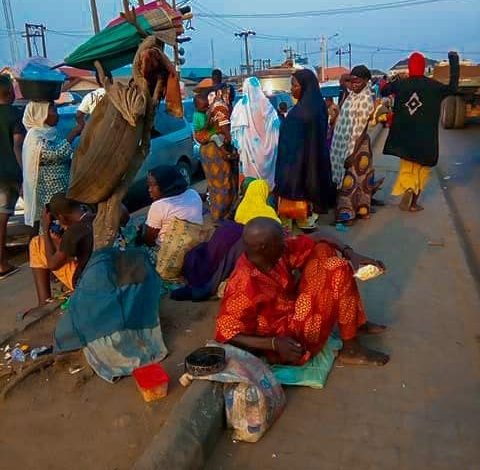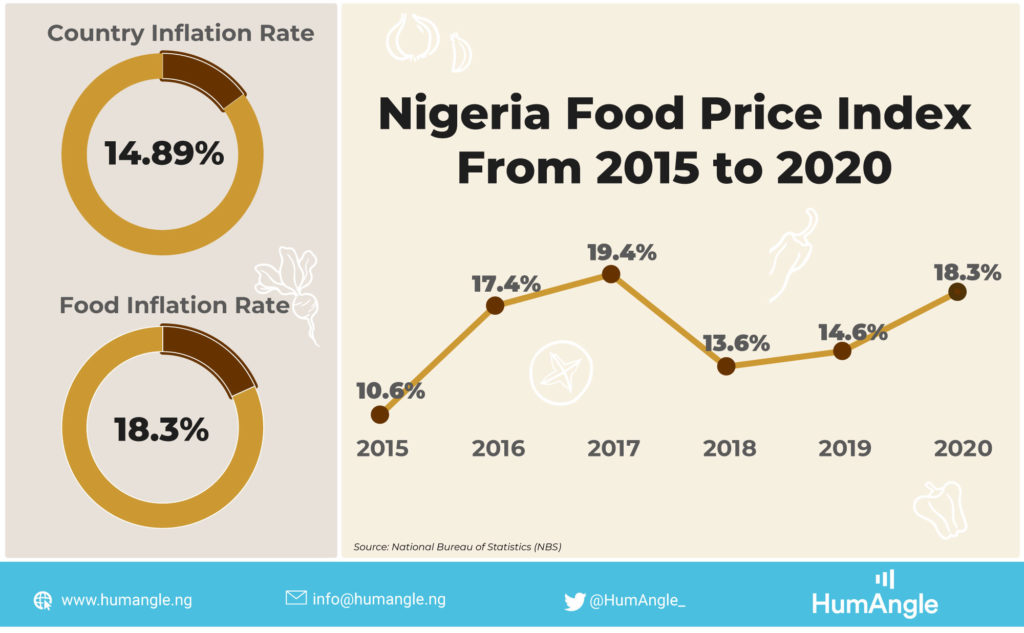How Economic Hardship Ruined Yuletide For Vulnerable Nigerians
''In the last six years, prices of food products have increased every December, analysis revealed''

Just like previous years, Segun* had anticipated a joyful festive season by the end of 2020 with his family, having to reunite, share and bask in provisions supplied to celebrate the season.
Segun is a low class Nigerian who hustles daily to feed his family, provide primary education for his children and pay dues on shelter. These responsibilities have caused him to jump on several jobs and trades, all to make ends meet.
For him, the festive period was expected to bring rest as Segun usually seizes the opportunity to spend more time with his family, raise enough to buy festive wares, cook some meals and reunite with friends. In 2020, this could not be achieved with restrictions on social gatherings and economic constraints defining how the festive season should be celebrated.
“I really don’t have a specific job. They call it jaman jaman, that’s involving too many occupations on availability or demands. I do this to feed my family daily, send my children to school and settle my debts. It’s the little sacrifice I have to make as a father but the country’s hardship is not helping matters.
“Before, at least every Christmas, I always ensure we cook a lot, buy new things and clothes for my family and pay visits to our extended family. 2020 was just different.
“I can’t save because there was no money. I will struggle to look for little change and spend it immediately when I get home. No work anywhere and things are very expensive at the market,” Segun said.
Nigeria’s 2020 in view
Like Segun and his family, Nigerians have had to deal with the rising cost of food products in 2020 after land borders were closed and the effect of COVID-19 pandemic hit the country’s economy.
President Muhammad Buhari, in a bid to control smuggling activities and importation of illegal products, shut down land borders across the country in August 2019. This move was targeted at promoting agriculture, artisanal trading and local manufacturing of goods.
However, by the end of 2019, Nigeria reached an inflation rate of 11.98 per cent, a 0.96 per cent increase, when compared to the inflation rate recorded in August 2019.
One year into the border closure, Nigeria’s inflation reached its highest increase in 29 months recording a 13.22 per cent rate while the prices of food sharply stood at 16 per cent.
Similarly, the country had responsively shut down all social gatherings and economic activities for months across the country before its gradual reopening, to control the spread of COViD-19 pandemic. These resulted in a slow pace in production, transportation of goods as well as transaction of trading activities.
By November 2020, a report by the National Bureau of Statistics (NBS) placed the country’s inflation at 14.89 per cent while it’s food inflation was at 18.3 per cent.
This implies that with an economic imbalance, Nigerians spent more to feed by the end of the year than the beginning. The rising cost of food prices, the second economic recession in five years, and the second wave of the pandemic had a great effect in determining the spendings of Nigerians during the festive season.
In several interviews with HumAngle, citizens stressed the importance of celebrating Christmas and New year, adding that the constraints on the economy and ban on social gatherings affected their celebration.
“The festive period is a season of joy and happiness, a period you share with your family and loved ones. We could not do much for that this year with several restrictions on gatherings. We could not go to the church to celebrate or visit extended family members,” Mrs Alabi John, a homemaker said.
“I have worked hard to ensure I put food on the table daily. It has not been easy since the beginning of 2020. The lockdown affected my business and on top of that, I had to spend more on buying and selling.
“For me, the festive season was not really that much of a celebration because I could spend as much as I could” Joshua Ike, a businessman, said.
The fatigue is in correlation with the food inflation rate published by the NBS in the last six years during the December period, which has shown sharp increase over time.
In December 2015, the food price index stood at 10.6 per cent. This rose to 17.4 per cent by December 2016 and 19.4 per cent in 2017.
There was, however, a drop to 13.6 per cent by the end of 2018 but a significant increase to 14.6 per cent in 2019. In November 2020, Nigeria hit food inflation of 18.3 per cent.
In the local market, traders said that the prices of regular food products increase on a weekly basis. Food products like rice, beans, oil, onion, pepper and tomatoes constantly increase.
“The burden is too much. We spend more on buying, we spend more on transport and this has a great effect on sales. We can get a bag today at N20,000 and get it the following week at N24,000 and this just continues to increase.
“We did not enjoy much patronage in the market because things are just too expensive to sell and customers won’t buy”, Bose* a market trader lamented.
With a 40.1 per cent poverty rate on the estimated 200 million population living below $1 per day, Nigerians hope for economic relief in 2021 as President Buhari assured them of economic revamp in the new year.
“Our focus is on revamping the economy through the national economic diversification agenda that supports the primary goal of national food self-sufficiency.
“As an administration, we are currently undertaking a series of special interventions designed to boost job creation and support the entrepreneurial drive of our youths.
“With the recent opening of our borders, we expect that the pent-up demand of legitimate cross-border and international trade will boost the fortunes of the many small businesses and agricultural enterprises that depend on Nigeria’s trade and commerce,” Buhari said in his 2021 New Year’s address.
Support Our Journalism
There are millions of ordinary people affected by conflict in Africa whose stories are missing in the mainstream media. HumAngle is determined to tell those challenging and under-reported stories, hoping that the people impacted by these conflicts will find the safety and security they deserve.
To ensure that we continue to provide public service coverage, we have a small favour to ask you. We want you to be part of our journalistic endeavour by contributing a token to us.
Your donation will further promote a robust, free, and independent media.
Donate HereStay Closer To The Stories That Matter





